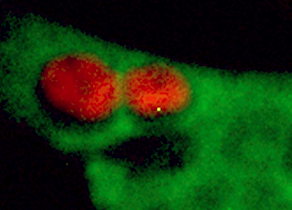
Experimental Nephrology
The Group Experimental Nephrology is focused on investigating gene regulation in the context of the kidney, but also of transcription factors and immunological genes. We functionalize human cell lines with modern genetic techniques like CRISPR/Cas9, FlpIn/FRT and TALEN to use them in luciferase or fluorescence reporter assays.
We study receptor activation in innate immune system activation. Those pattern recognition receptors recognize a wide range of molecular patterns. Their activation recruits and activates signal cascades leading to the translocation of transcription factors from plasma to the nucleus. The transcription of inflammation-specific genes is activated and induces the innate immune response.
The generation of cell-based toxicity reporter systems in human cell lines and induced pluripotent stem cells (iPS cells) is a possibility to study organ-specific toxicity reactions. We differentiate iPS cells into different cell types and monitor changes in the cell identity by reporter gene activation and analyze cell function by FACS, fluorescence microscopy and molecular biology techniques.
keywords: genetic modification, cloning, transient and stable transfection, fluorescent microscopy, luminometry


Figure: Left: Life cell imaging of a transcription factor (green) and a nuclear protein (red) right: Simplified principle of reporter gene activation after stimulation of a TLR pathway

